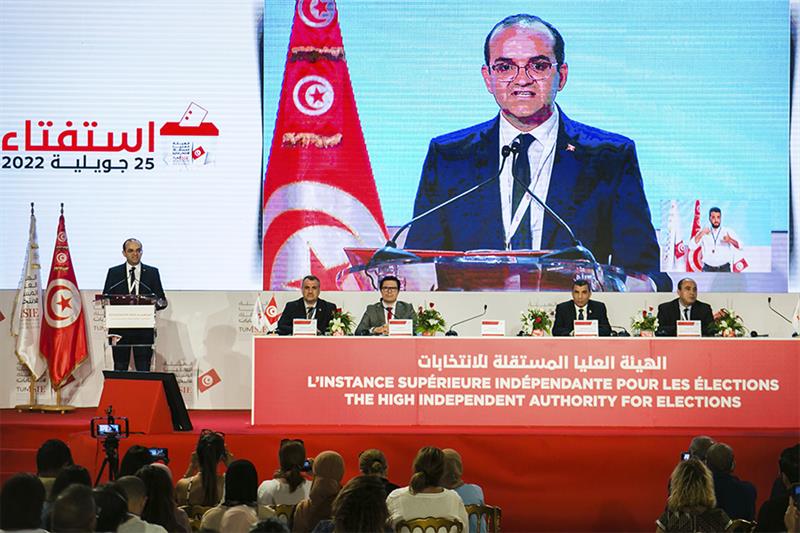
Farouk Bouasker, the President of Tunisia s Independent High Authority for Elections announces the results of the constitutional referendum in Tunis, Tunisia, Tuesday, July 26, 2022. AP
In this referendum, Tunisians voted on the new draft constitution, with a 27.5 percent turnout of registered voters. Of the electors, 94.6 percent voted for the new constitution, while 5.4 percent rejected it.
Passing the new constitution has raised many questions about the political future of Tunisia and national action in the near future, especially as Tunisia has been in the throes of a deep crisis since the adoption of the exceptional measures.
The new text will transform Tunisia’s regime from a parliamentary system to a presidential one, in which the Tunisian president enjoys far-reaching powers, in return for limiting and possibly undermining the powers of other authorities, especially the legislative ones.
However, the most significant amendment in addition to the above, in my estimation, is the article which states: “Tunisia is part of the Islamic Ummah [nation] and the State alone must work to achieve the goals of pure Islam, in preserving life, honour, wealth, religion and freedom.” This amendment will mean putting an end to the political use of religion, downsizing the influence of political Islam in Tunisia, especially the Ennahda Movement.
It is likely that the state of ‘political polarisation’ in Tunisia will continue for some time after the new constitution is passed and approved, in light of the opposition of many Tunisian political currents to the referendum and their failing to recognise its results. This is especially true for the Islamist Ennahda Movement, the National Salvation Front and the Dignity Coalition (Al Karama). This is not to mention the civil parties that reject the draft of President Kais Saied but are not affiliated to the Ennahda Movement, including the Free Destourian Party, the Democratic-Republican Current, Ettakatol and the Workers, as well as the Tunisian General Labour Union.
These political currents agree that the adoption of President Saied's draft constitution means "one-man rule" which does not include "participation," threatening the democratic gains that Tunisia has achieved in the post-Jasmine Revolution phase. This trend has already begun to confront Saied's measures, whether by resorting to the judiciary, or inviting Tunisians to protest and head to the streets to express their rejection of the president's draft, and promoting the "illegality" of the current system of government in Tunisia.
Meanwhile, there is another front that supports President Saied, spearheaded by the popular groups that prefer stability to various political calculations, in addition to parties like the People's Movement and Union for Tunisia, the Tunisia Forward Movement and the Popular Movement. These parties see the adoption of the constitution as an opportunity to complete the building of Tunisian institutions, to complete the ‘Correction Path’ and to cut all ties with the years of "corruption and terrorism," in reference to the era of the rule of the Ennahda Movement.
By adopting and passing the new Tunisian draft constitution, the opposition front, led by the Ennahda Movement, has failed to obstruct the draft constitutional referendum and to mobilise the public to do so. This shows the declining popularity of these trends and their inability to reach the Tunisian street, while proving the continuing popularity of the Tunisian president among the Tunisians, who prefer stability to political wrangling. Therefore, it can be said that voting ‘Yes’ to the new constitution is tantamount to voting ‘No’ to the Muslim Brotherhood’s return to power in Tunisia. President Saied may exploit this result to end the political presence of the Tunisian Muslim Brotherhood by issuing an electoral law that ‘provides for the dissolution of parties with a religious reference.’
However, this step has increased the challenges facing President Saied and his government. Given his broad powers, he will be responsible to the Tunisians for dealing with the economic and social crises that are worsening every day, and he will not be able to claim that any other political trends are to blame for this. The president will be required in the near future to complete the reforms and put the country on the right track with a participatory approach, because an increasing number of opposition trends is not in the president’s interest, nor in the interest of Tunisia, as it will lead to greater instability at every level.
*The writer is a political researcher specialising in regional security issues
Short link: